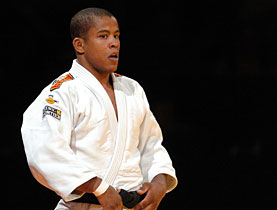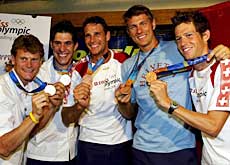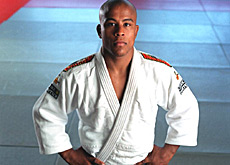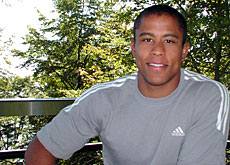Judo black belt grapples with Olympic challenge

After being eliminated in the first round at both the Sydney and Athens Games, Sergei Aschwanden travels to Beijing hoping to win the elusive medal he so craves.
swissinfo caught up with the judoka, who will be competing in his final Olympics.
Trainers and a grey hooded tracksuit with kangaroo pockets: Sergei Aschwanden certainly looks very relaxed as he arrives at the canteen of the Swiss Federal Institute of Sport in Magglingen.
This centre of excellence is something of a second home for Aschwanden – he can’t go more than a pace or two without having a chat with another athlete or sports official.
For years Aschwanden has shed blood, sweat and tears onto the tatami mats with the rest of Switzerland’s judo elite from their base looking out over Lake Biel. Since he became a professional almost ten years ago, he has been the undisputed number one in Swiss judo.
Aschwanden has just completed a three-week stint spending 16 to 17 hours a day in the 10m2 confines of an oxygen chamber. “It’s the same as spending time at high altitude,” he explains. “But being in the oxygen tent here means I can work with sparring partners during the day.”
This state of forced “isolation” (300 hours in total to achieve the desired effect) enables him to focus fully on himself and to begin his final phase of preparation in a calm state of mind, a far cry from the hullabaloo he experienced four years ago prior to Athens.
“Everything’s different now,” he says. “Around this time four years ago, I was European champion and had come second in the previous year’s World Championships. The expectations were different back then, and there was an enormous amount of pressure. This time – and I have no doubt this is partly thanks to Euro 2008 [which Switzerland co-hosted] – I can follow my normal routine and prepare for Beijing in peace and quiet.”
Foreign sparring partners
Since moving up from half-middleweight to middleweight just under a year ago, Aschwanden has been following a strict training regime. The most important feature of this has been a series of round trips to Moscow, Minsk and Madrid to search for sparring partners of the necessary standard, before returning to Switzerland for long periods of recovery work.
“This training programme can be adapted depending on any injuries I pick up and according to the warm-up competitions I take part in,” he said.
“One thing’s for sure, though: I’m leaving for Japan on July 20 to get acclimatised, not just because the air is a bit cleaner there, but also because Japan is the home of judo and I’ll have many more top-quality sparring partners to choose from.”
Aschwanden is due to arrive in Beijing on August 4, only nine days before his competition begins. Apart from attending the opening ceremony, he will confine himself to the Olympic village and the training hall.
“I need to get a feeling for the atmosphere in the hall where I’ll be competing,” he says. “For example, I never listen to music before a match. I wouldn’t be mentally ready if I did. And this is my last chance at the Olympics, so I need to be as alert as possible.”
African perspective
Although he is knows his career will soon be over – Aschwanden has said he wants to compete at the 2009 World Championship before retiring – he is trying not to put himself under too much pressure.
“It’s about keeping things in perspective. I’m currently focused on winning a medal at the Olympics, but I know my Beijing ambitions aren’t the be all and end all,” he says.
“My mother is Kenyan and I still have a half-brother who lives in Africa with whom I’m very close. I follow all the latest news from Africa, and the political issues that influence the lives of the people I know there. I feel it affects me, too, but it also helps me deal with the pressures of high-level sport.”
Aschwanden travelled to Kenya four years ago to get over his disappointing experience at the Athens Games.
“When I arrived, everyone was happy to see me. The warmth of the welcome wouldn’t have been any different had I arrived as Olympic champion,” he marvels. “People there just take you for who you are. They’re happy for you if you win and sad if you lose, but there are more important things for them in life than just that. The real pleasure they experience is from being able to spend time with you.”
He reveals that the African side of his personality is reflected in his carefree nature – which, he stresses, should not be mistaken for indiscipline – and in his optimistic outlook on life. These attributes help him to keep a level head when the chips are down.
“I’m in good health. I’ve got two arms and two legs – what more could I possibly want?” Then he grins. “Well, an Olympic medal would be nice, too!”
swissinfo, Mathias Froidevaux in Magglingen
Son of a Swiss father and Kenyan mother, Sergei Aschwanden was born on in December 1975 in Bern. He has one older brother and a younger sister.
He spent the first seven years of his life in the Swiss capital before moving to Bussigny near Lausanne.
As a boy, Aschwanden was always full of energy. He began judo at the age of seven – a pastime which he combined with other commitments such as music and dancing, which he did for five years.
Already a brown belt by the age of 12, Aschwanden improved his technique by learning from adult sparring partners. It was aged 15 that he decided to commit himself fully to the martial art.
Aschwanden decided to turn professional after gaining his academic qualifications in 1997. He has not looked back since. National coach Léo Held arrived on the scene in 1996 and has played an instrumental role in Aschwanden’s success.
In addition to winning the Swiss Championships eight times, Aschwanden has also claimed two European Championship titles (2000 and 2003), three European bronze medals and a bronze and silver at the World Championships (2001 and 2003).
Aschwanden speaks French with his father and Swiss-German with his mother. His parents speak English to each other – a language in which Sergei himself is also able to communicate.

In compliance with the JTI standards
More: SWI swissinfo.ch certified by the Journalism Trust Initiative



You can find an overview of ongoing debates with our journalists here . Please join us!
If you want to start a conversation about a topic raised in this article or want to report factual errors, email us at english@swissinfo.ch.